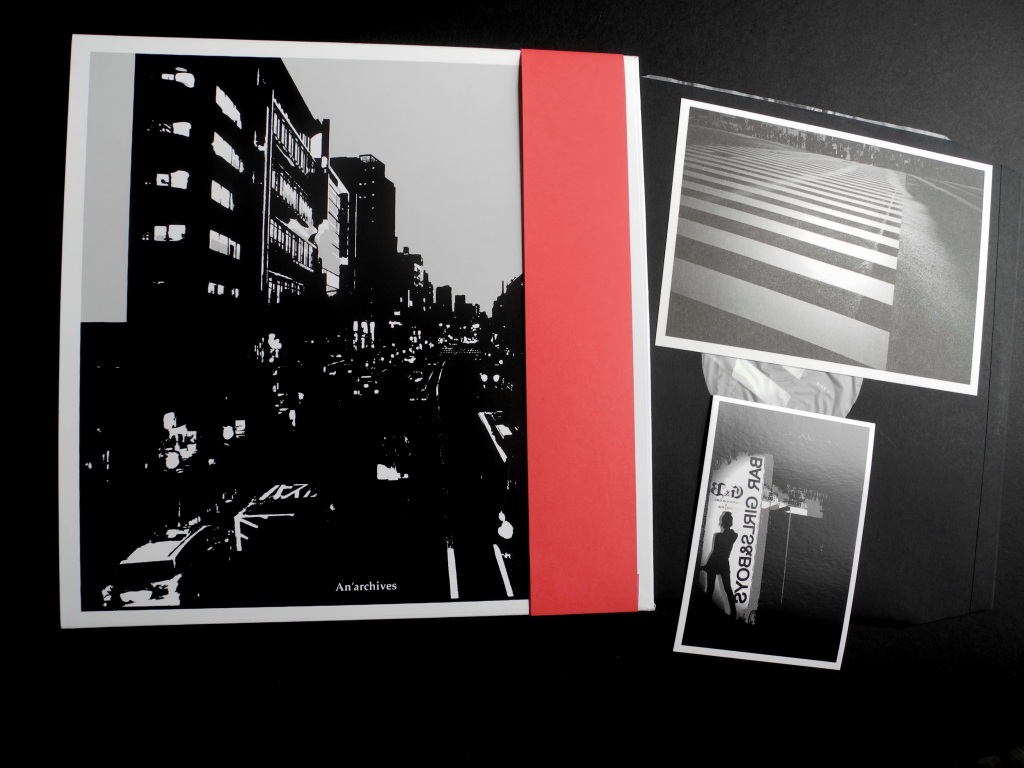Kawaguchi Masami LP “Self Portrait” An’archives
Edition of 285, comes in a silk-screened tip-on / “old style” jacket with obi (red or black), inserts and a postcard
Liner notes by Jon Dale
It’s been almost three decades since Japanese guitarist and songwriter Masami Kawaguchi first broke cover, with his group Broomdusters and their debut album, 23 hours 30 minutes (Purifiva, 1997). In the intervening years, Kawaguchi has maintained single-minded discipline, through his membership of some of the Japanese underground’s greatest groups (Miminokoto, LSD March, Los Doroncos, Usurabi, and his projects with Keiji Haino: Aihiyo and The Hardy Rocks); the exhilarating music made by his own band, New Rock Syndicate; and a small clutch of intimate (mostly live) solo recordings.
But nothing in his history has been quite as distinctive, nor as singular, as Self Portrait. The title’s a strong clue, of course, but the real tell is in the consummate nature of the eight songs here – this is Kawaguchi articulating most clearly his vision of what rock music could and should be, and what it means to him. His second studio solo album, it’s both dedication and hymn to the music that keeps Kawaguchi moving. Deftly crafted and sweetly intimate, Self Portrait is bursting with great songs, shufting from gorgeous acoustic folk-blues melancholy – see “Visions Of Marianne”, and the dreamlike closer, “On The Rooftop”, which Kawaguchi describes as his answer song to the Rolling Stones’ “As Tears Go By” – to storming rock monsters.
To that end, it’s a goddamn thrill to hear Kawaguchi and friends jamming on a James Brown riff through “Awake”, squeezing all the nuance out of its stop-start, staccato rhythms. Elsewhere, Kawaguchi lazily strums a psychedelic air, on the Syd Barrett-esque “Blindfold Blues”, and rifles through his backpack to find one of his earliest songs, the strung-out, levitating “Nothing”, which he wrote when he was nineteen years old. “Song For Golden Hair” pays tribute to the psychedelic sixties; “Drinking With Mr. K” remembers Japanese psych-rock legend Jutok Kaneko of Kousokuya.
Kawaguchi’s been playing the long game, slowly whittling away at a unique and personal take on rock and the blues, one that’s equal parts reverent and forward-thinking, playful and deeply committed. Self Portrait is the clearest articulation yet of his dedicated vision. And it’s a total blast.
SOLD OUT
Usurabi LP “Remains of the Light” An’archives
Edition of 285, comes in a silk-screened (2 colors with metallic ink) 3 panels foldout jacket with obi (red or black), inserts and a postcard
Liner notes by Michel Henritzi
Remains Of The Light, the debut album by Japanese trio Usurabi, is a gorgeous thing – six generous, deftly melodic songs that stretch out slowly, breathing deeply, yet never outstaying their welcome. The members of Usurabi started playing together in 2017, but they’d known each other for several decades, meeting via their involvement in a music club at university. Led by songwriter, singer and guitarist, Toshimitsu Akiko, previously of psych-pop duos Doodles and Aminome, the trio is completed by Kawaguchi Masami (New Rock Syndicate, Hardy Rocks, Miminokoto) on bass and guitar, and Morohashi Shigeki (Majutsu no Niwa, Uchu Engine, peaflan, Alraune) on drums.
Kawaguchi and Morohashi had already played together in the legendary Broomdusters, a group they formed when they were both university students. Toshimitsu, long a fan of Broomdusters, formed Usurabi to explore what she describes as “rock music that features vocal mainly and floating sound like waves.” It’s a clear, simple and apt description of what they do. Toshimitsu’s songs are graceful, each having a dynamic arc to their construction, while allowing for all kinds of subtle inflection from her guitar, sometimes tussling with Kawaguchi’s flinty, overloaded blues; Toshimitsu drives the songs with subtletly and wit, sculpting waves of energy from his kit.
Throughout, Toshimitsu’s songs hint at questions, complexities, metaphors: allusions and illusions. Songs like “Brunnera” and the closing “Constellation” are adrift, beamed out on rays of light, the trio’s empathic playing harnessing a subtle kind of psychedelia. “Constellation” explores Toshimitsu’s thought, “Am I allowed to turn the feeling I can nothing to do into a constellation, like ancestors did?” The lovely, shaded pop of “Autumn Rain” translates a Toshimitsu solo arrangement into a stripped-back, delightful slice of happy-sad nostalgia; “The rain is always sweet to me,” Toshimitsu says of the song.
Ask the trio what other music informs Usurabi, and they share names, some expected, some surprising: Kaneko Jutok, Les Rallizes Denudes, The Doors (“The first real rock experience to me,” Toshimitsu recalls), Captain Beefheart, The Rolling Stones. You can hear elements of all of this music in their songs, but mostly it’s more a hint, or a tint, than an obvious acknowledgment; the playing certainly shares the hopeful freedom of Kaneko, and the stridency and sensitivity of the Stones at their best. It also recalls the independent music of groups like The Pastels; like that outfit, Usurabi have absolute integrity in their sound. It’s quietly ambitious, and quite beautiful.
SOLD OUT



